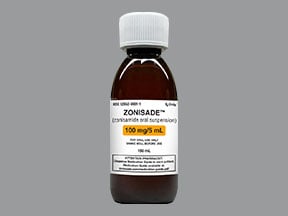
Zonisade Coupons & Savings Card – Discount Prices from $427.95
My prescription
Edit
150ML of 100MG/5ML, Zonisade (1 Bottle)
Select pharmacy

CVS
$450.03
COUPON PRICE
Albertsons
$427.95
COUPON PRICE
Walmart
$429.57
COUPON PRICE
Walgreens
$440.56
COUPON PRICEZonisade savings card
Show this card to your pharmacist
Albertsons
$427.95
BIN
ID
PCN
GRP
019876
LHDB216EFE
CHIPPO
LHX
Powered by
Related anti-epileptics prescriptions
More prescriptions for epilepsy
Related anti-epileptics prescriptions
More prescriptions for epilepsy
Price history for Zonisade
1 Bottle, 150ML of 100MG/5ML
Average retail price for Zonisade
Average SaveHealth price for Zonisade
Our price history data is based on aggregated prescription data collected from participating pharmacies in America. Our prescription data updates daily to reflect the latest price changes. If you notice a missing data point, it means there wasn't sufficient data available to generate a monetary value for that date.
*Retail prices are based on pharmacy claims data, and may not be accurate when we don't have enough claims.
Zonisade dosage forms
Dosage Quantity Price from Per unit 150ML of 100MG/5ML 1 Bottle $427.95 $427.95 150ML of 100MG/5ML 2 Bottles $840.91 $420.45 150ML of 100MG/5ML 3 Bottles $1253.86 $417.95
| Dosage | Quantity | Price from | Per unit |
|---|---|---|---|
| 150ML of 100MG/5ML | 1 Bottle | $427.95 | $427.95 |
| 150ML of 100MG/5ML | 2 Bottles | $840.91 | $420.45 |
| 150ML of 100MG/5ML | 3 Bottles | $1253.86 | $417.95 |
Using the SaveHealth discount card, what is the price of Zonisade without insurance?
Using the SaveHealth discount card, the price of Zonisade without insurance is $427.95.
What is the price of Zonisade at CVS?
The price of Zonisade at CVS is $450.03.
What is the price of Zonisade at Walgreens?
The price of Zonisade at Walgreens is $440.56.
What is the price of Zonisade at Walmart?
The price of Zonisade at Walmart is $429.57.
